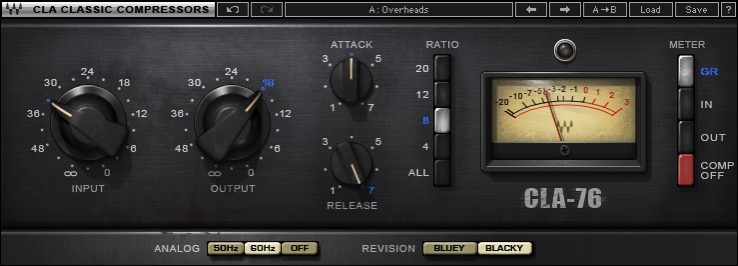
Compression and Level Matching

This might ruffle a few feathers because it goes against conventional teaching, but I think trying to level match something that’s being compressed is overrated. Plus, in a lot of ways, it’s not even possible. Now, hang with me for a minute before you tune out and start arguing.
When I’m talking about level matching after compression, I’m talking about the idea that we want to make our compressed version of something as loud as our original version so when we pop the compressor in and out the level doesn’t change. The reason this idea gets thrown around is because our ears are easily tricked into thinking louder things sound better. This can set louder things as a big trap because we may start thinking something is actually better when it’s not and it’s just louder. The other trap in this is having something louder can also hide when things are over-compressed if we’re not careful. This can especially bite newer engineers who aren’t used to hearing or understanding what over-compression sounds like, although, over-compression isn’t always bad, either, but that’s a topic for another day.
Sounds like level matching is a good idea, right?
Sure, at first glance it definitely is. For a long time I promoted it, taught it, and have probably even written about it. I still probably rough it in most of the time, but I think it’s far overrated these days.
Part of the problem is you can’t really level match compression against no compression. For example, let’s consider something that often needs a good amount of compression in a modern worship mix: the vocal.
The primary reason I use compression on a vocal is to even out the performance. I’m using that compression because the level of the vocal is constantly fluctuating which makes it difficult to get it to sit with the rest of the band. I even made a video on this not too long ago.
So, if I employ a compressor to even that fluctuating level out, how am I supposed to match an evened out version to a fluctuating version?
The answer is I can’t because they’re now two very different things. The evened out version will be perceptually louder because that’s what compression does in that application! Compression raises the average level, and that’s part of the whole point of doing it here.
“Yeah, but you can at least get them in the ballpark to be level matched.”
In some situations this is true, but not always. To me, if you’re using compression as an effect, level matching to hear the difference is more achievable and makes more sense to me because you’re getting more of an envelope change than reshaping the level of the performance. The problem is most live sound guys aren’t using compressors for this. Most guys use it for control.
Now while I may be pushing back against level matching, don’t take this as advocating for getting a bunch of extra gain with compressors. In general, I don’t think we typically want to be getting big gains in level when we apply processing. That’s really more of a gain staging issue, and there are often better places in the signal chain to get a lot of level if we need it.
Plus we also don’t want to get tricked into things sounding better that are actually just louder. However, I believe that has more to do with the experience level and confidence of an engineer. At a certain point you should be able to tell if what you’re doing is improving things, and hopefully that’s early in your career regardless if you’re volunteering or getting hired.
What I want to get at here is I think a lot of engineers put way too much emphasis on matching compressor levels which, in the grand scheme, doesn’t even matter because ALL that matters is what the final mix sounds like. Who cares how you get there as long as you get there? I believe that using best practices in engineering can often help you get there faster and create better results, and that’s why I enjoy teaching them. But mixing and audio engineering isn’t math class where you have to show your work. The final answer, or mix in our case, is all that matters, and it’s what we get be judged by.
Now, if you’re new to using compression, I think you should focus on learning to hear the effects of compression on sounds. You can sit around and try and A/B between subtle amounts of compression on almost level matched versions, but I think you’ll waste a lot of time doing that because when tools like compression are new for you, it’s very difficult for most people to hear what’s actually going on. I think you need to sit with a compressor and CRANK it on stuff.
Seriously.
Bury the needle.
Get some different recordings of sources and run them into drastic amounts of compression and listen to what is happening. Hit the compressor as hard as you need to in order for the effects of it to be completely obvious do you. Don’t worry about numbers of gain reduction. Go ahead and bang it hard.
One of my pet peeves these days are YouTube videos from engineers demonstrating compressors where they sit there barely hitting them oooooh‘ing and ahhhhhh‘ing as it barely taps the needle. While there are times when only a couple of dB can make a difference, it’s not something I generally get excited about, and I doubt a lot of those guys can really hear what’s happening or if the difference will matter that much in a dense mix. Plus, if all you’re doing is at most 2 dB of gain reduction on an input, there are probably better ways to spend your time and resources mixing.
I think if you want to know what a compressor is really going to do you need to spank it a bunch. If you spank it and start comparing with stuff that is not compressed you’ll have a much easier time hearing what that compressor is actually doing. Plus, you’ll instinctively adjust the levels of the two so you can keep them close enough to interpret differences. All you need be able to do is make a judgement call when you’re mixing. You don’t need to match things dead on.
I think when you understand what tools like compressors do at extremes it helps you start hearing those effects at lower amounts as well, but more importantly it helps you form reasons in your brain on why to use compression. If you can’t hear why something needs a particular type of processing, you shouldn’t be using that processing because that’s how you dig yourself into a hole that can stack up quickly in a large mix.
There’s a myth out there you should steer away from large amounts of compression because it sounds bad, and that’s a ridiculous notion. People don’t mess up compression because they use too much. They mess it up because they can’t hear what they’re doing with it and make poor choices as a result. Many of the classic records the older generations love to wax poetically about have oodles and oodles of compression in use. For example, the Beatles banged the snot out of compressors. The big thing about records like those, though, is the choices to use lots of compression were made intentionally based on the way it sounded. They didn’t just do it because they thought they should or heard they should do “about that much”.
Now, while it might be apparent something needs compression if you listen to it isolated, in most cases I find a need for compression is much more apparent in the context of a mix. So I don’t turn on compressors on things just because. I get them up in the mix and see where things are at. Then I might futz with Attack and Release a bit in isolation if I’m really trying to shape things. The bulk of it gets dialed in against the rest of the mix because for me it’s the rest of the mix that really dictates how much compression needs to get done.
Here’s one last thing I want to say about learning to use compression or EQ or reverb or anything in audio for that matter. You probably need to get it wrong before you will get it right. Don’t worry about the rantings of old guys about how you shouldn’t overdo things and to be conservative. They’re probably not always wrong, but you’re going to have to overdo it to figure that out. So don’t be afraid to fail so you can start winning. Surround yourself with people you trust who can lend honest ears to tell you when something sounds off, and then go for it.
Compression is often a big topic when I’m out teaching other engineers. If you’d like to find out more about how you and your team can improve your mixes and get better at using compression, drop me a line through my Contact page.




